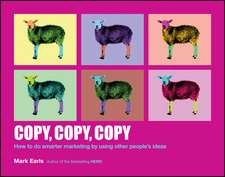The Trojan Horse: The Growth of Commercial Sponsorship
Autor Dr Deborah Philips, Prof. Garry Whannelen Limba Engleză Hardback – 14 aug 2013
| Toate formatele și edițiile | Preț | Express |
|---|---|---|
| Paperback (1) | 258.42 lei 6-8 săpt. | |
| Bloomsbury Publishing – 25 feb 2015 | 258.42 lei 6-8 săpt. | |
| Hardback (1) | 658.11 lei 6-8 săpt. | |
| Bloomsbury Publishing – 14 aug 2013 | 658.11 lei 6-8 săpt. |
Preț: 658.11 lei
Preț vechi: 765.24 lei
-14% Nou
Puncte Express: 987
Preț estimativ în valută:
125.93€ • 137.22$ • 106.11£
125.93€ • 137.22$ • 106.11£
Carte tipărită la comandă
Livrare economică 23 aprilie-07 mai
Preluare comenzi: 021 569.72.76
Specificații
ISBN-13: 9781472507389
ISBN-10: 147250738X
Pagini: 288
Dimensiuni: 156 x 234 x 25 mm
Greutate: 0.59 kg
Ediția:New.
Editura: Bloomsbury Publishing
Colecția Bloomsbury Academic
Locul publicării:London, United Kingdom
ISBN-10: 147250738X
Pagini: 288
Dimensiuni: 156 x 234 x 25 mm
Greutate: 0.59 kg
Ediția:New.
Editura: Bloomsbury Publishing
Colecția Bloomsbury Academic
Locul publicării:London, United Kingdom
Caracteristici
There is a potential market across several disciplines and sectors
Notă biografică
Deborah Philips is Professor of Literature and Cultural History at the University of Brighton, UK.Garry Whannel is Professor of Media Cultures, and Director of RIMAP: the Research Institute for Media, Arts and Performance, at the University of Bedfordshire, UK.
Cuprins
AcknowledgementsIntroduction: The Trojan Horse - from Patronage and Philanthropy to Product Promotion and Privatisation1. The moment of 1945 and its legacy2. A Culture of Consensus? The Arts from 19453. Pay up and play the game: Sport and Sponsorship4. Neo-Liberalism and New Labour: From Thatcher to Blair5. Culture and Enterprise: The Arts from 19796. One Amazing Day . . .? The Millennium Dome7. Education, Education, Education . . . 8. Safe in their Hands? Health and the Market9. All in it Together?Appendix: Our Corporate PartnersBibliographyIndex
Recenzii
Deborah Philips and Garry Whannel have given us a great gift--a book that manages to transcend its times, even as it captures them. They analyze the ruins of neoliberalism's baleful influence on British life, from culture to sport to health. Blending political economy with cultural studies, The Trojan Horse expertly describes thirty years of struggle and mystification.
Commercial sponsorship now pervades our lives, intruding private interests into the management of our public and collective affairs at great social cost and with few economic benefits as the weaknesses and failures of free-market economics become increasingly manifest. By demonstrating this in convincing detail, Deborah Philips and Garry Whannel's broad-ranging and incisive study provides an invaluable service in re-asserting the principles of publicness that need to be defended against the Trojan Horse of privatisation. An important and timely book.
From art and sport to education and health, the authors describe how seemingly benevolentsponsorship is the Trojan Horse that has facilitated a creeping erosion of corporate interestsinto the public sector. In a devastating critique of the demise of the welfare state, Philips andWhannel document the colonisation of public space by commercial priorities that enables privateenterprise to set the agendas of our schools, hospitals, care homes and surgeries with deleteriousconsequences. Wide-ranging, insightful and shocking to boot, this is a "must read" for anyoneinterested in the nature of public value and the hidden power of corporations.
Commercial sponsorship now pervades our lives, intruding private interests into the management of our public and collective affairs at great social cost and with few economic benefits as the weaknesses and failures of free-market economics become increasingly manifest. By demonstrating this in convincing detail, Deborah Philips and Garry Whannel's broad-ranging and incisive study provides an invaluable service in re-asserting the principles of publicness that need to be defended against the Trojan Horse of privatisation. An important and timely book.
From art and sport to education and health, the authors describe how seemingly benevolentsponsorship is the Trojan Horse that has facilitated a creeping erosion of corporate interestsinto the public sector. In a devastating critique of the demise of the welfare state, Philips andWhannel document the colonisation of public space by commercial priorities that enables privateenterprise to set the agendas of our schools, hospitals, care homes and surgeries with deleteriousconsequences. Wide-ranging, insightful and shocking to boot, this is a "must read" for anyoneinterested in the nature of public value and the hidden power of corporations.


















